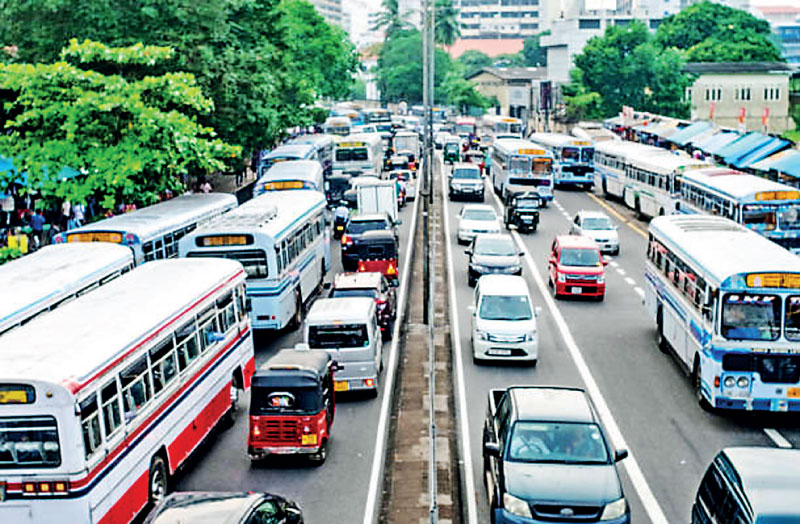Monday Feb 23, 2026
Monday Feb 23, 2026
Thursday, 23 January 2025 03:27 - - {{hitsCtrl.values.hits}}

Adopting disciplined driving habits, respecting traffic laws, and reporting instances of reckless driving can go a long way in reducing neglidents
 Sri Lanka has long struggled with the scourge of road incidents. Every day, headlines scream about collisions, injuries and fatalities on our roads. For too long, we have collectively labelled these events as “accidents”, suggesting that they were unavoidable, unforeseen or purely coincidental. But is that truly the case?
Sri Lanka has long struggled with the scourge of road incidents. Every day, headlines scream about collisions, injuries and fatalities on our roads. For too long, we have collectively labelled these events as “accidents”, suggesting that they were unavoidable, unforeseen or purely coincidental. But is that truly the case?
A significant portion of these road incidents arises not from chance or mechanical failure but from sheer negligence, recklessness and wilful disregard for road safety. Drivers under the influence of alcohol, those who speed far beyond the legal limits, those who ignore basic road rules and those who persist in driving despite fatigue, to name a few instances, are all knowingly endangering not just themselves but everyone else on the road. Referring to such preventable incidents as mere accidents absolves the responsible parties of accountability and trivialises the consequences of their actions.
Introducing the term: Neglidents
To address this issue, it is high time we differentiate between genuine accidents and incidents caused by negligence. This is where the term “Neglidents” comes into play. A neglident refers to any road incident that results from a driver’s negligent or reckless behaviour – a preventable event caused by a conscious disregard for safety. Unlike accidents, which are truly unforeseen and unintended, neglidents are foreseeable and avoidable. A driver who speeds excessively knows that the risk of losing control increases. A driver who consumes alcohol before getting behind the wheel is aware that their reaction time will be impaired. A driver who had a sleepless night is well aware that fatigue affects alertness. In all these scenarios, the driver is knowingly courting danger.
By adopting the term “neglidents,” we not only draw attention to the preventable nature of these incidents but also create a clear framework for accountability. Let me formally introduce the coined word, “Neglident”.
Definition of “Neglident”
Neglident (noun): A preventable road incident caused by a driver’s negligence, recklessness, or wilful disregard for safety, such as speeding, driving under the influence or ignoring traffic regulations.
Neglident (adjective): Describing an incident that results from negligent or reckless behaviour on the part of a driver.
Examples of usage:
1. The collision at the intersection was not just an accident; it was a neglident caused by reckless speeding.
2. Drunk driving increases the likelihood of neglidents, putting everyone on the road at risk.
3. By enforcing stricter road rules, we can reduce the number of daily neglidents.
Key characteristics of a neglident
1. Foreseeability – The driver could have anticipated the potential danger but ignored it.
2. Preventability – The incident could have been avoided if proper care was taken.
3. Negligence – It results from behaviour such as speeding, distracted driving or ignoring road rules.
4. Accountability – Responsibility for the incident lies with the driver due to their deliberate or careless actions.
The need for distinct rules and punishments
The “Clean Sri Lanka” campaign aims to restore order and discipline across various sectors, including road safety. In this context, it becomes crucial to distinguish between genuine accidents and neglidents in our legal and regulatory frameworks.
For too long, drivers who cause preventable incidents due to reckless behaviour have faced punishments designed for accidents – lenient penalties that fail to reflect the severity of their actions. If we truly wish to foster a culture of road safety and accountability, rules and regulations governing neglidents must be stricter, with harsher punishments that serve as both a deterrent and a means of justice.
Suggested measures to address neglidents
1. Legal definition of neglidents: Introduce a legal definition of neglidents in Sri Lankan traffic law, categorising them separately from genuine accidents.
2. Stricter penalties: Implement more severe penalties for drivers involved in neglidents. This could include higher fines, mandatory driver retraining programs, suspension or revocation of licenses and in severe cases, imprisonment.
3. Public awareness campaigns: Promote the concept of neglidents through public awareness campaigns. Collaborate with media outlets, schools and workplaces to educate citizens about responsible driving and the consequences of reckless behaviour.
4. Incentives for safe driving: Encourage safe driving practices by offering incentives such as lower insurance premiums for drivers with clean records and commendations for professional drivers who maintain exemplary safety standards.
5. Enhanced law enforcement: Strengthen traffic law enforcement through better-equipped traffic police units, use of technology such as speed cameras and breathalysers, and zero-tolerance policies for offences like drunk driving and speeding.
The role of citizens in preventing neglidents
While the Government’s campaign is a positive step forward, lasting change requires active participation from all citizens. Each of us must take personal responsibility for our actions on the road. Adopting disciplined driving habits, respecting traffic laws, and reporting instances of reckless driving can go a long way in reducing neglidents.
Moreover, setting a good example for future generations is crucial. The lawlessness and disregard for rules that impacted Sri Lanka in the past were often influenced by challenges in governance and issues of corruption. As citizens, we must break this cycle by upholding values of discipline, respect, and integrity in every aspect of life – including how we drive.
A road to a safer future
The road to a safer and more disciplined Sri Lanka begins with acknowledging that not all road incidents are accidents. By popularising the term “neglidents” and advocating for stricter rules and penalties, we can foster a culture of accountability and responsibility on our roads.
The launch of the “Clean Sri Lanka” campaign gives Sri Lankans a unique opportunity to reset societal norms and expectations. Let us seize this moment to drive home the message that reckless behaviour on the road is not just dangerous – it is unacceptable. Together, we can build a future where preventable tragedies are minimised, and where the roads of Sri Lanka are safe for all.
(The writer can be reached via [email protected].)